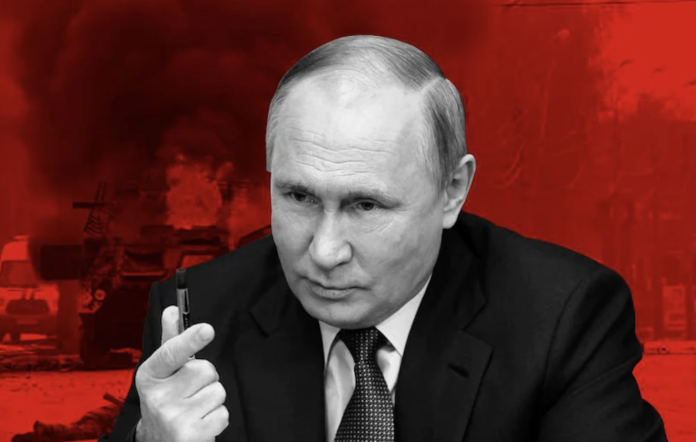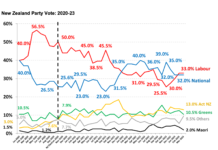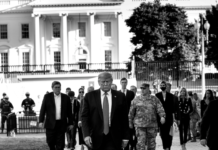This week the war in Ukraine is dominated by strategic matters, Putin is delicately playing his game trying on the one hand to maintain his political position in Russia; and on the other to divide and conquer the international community. The war on the ground in Ukraine reflects these objectives; the most important operation being the campaign to damage Ukrainian civil infra-structure. Iranian drones and modified S 300 anti-aircraft missiles bombarding key parts of the Ukrainian power grid. This campaign has kept lights out (and heating off) in tens of thousands of homes across Ukraine as autumn’s first rains start to fall, heralding the approach of winter.
The two notable features of the campaign against civilian power infra-structure are that it has very limited military value and is likely driven by Russian politics. Hitler tried unsuccessfully to use this strategy against the United Kingdom at the start of World War Two. Later, in the same war allied destruction of civilian infra-structure failed to stop Germany or Japan fighting; and a generation later the United States strategic air campaign against North Vietnam was also unsuccessful. History demonstrates that targeting civilian targets does little to reduce a country’s military capability (that is built to resist such attacks) and instead tends to steel the resolve of the people being attacked. Putin is a student of history, so probably understands this dynamic but is using this campaign as a relatively cheap way to demonstrate to his ultra-nationalist supporters that Russia is striking back. The use of Iranian drones and modified anti-aircraft missiles rather than dedicated precision strike weapons like Kalibre cruise missiles reinforces this assessment. Why use up Russia’s dwindling stock of accurate and dangerous cruise missiles on a campaign that is driven by political goals?
And; Russia’s political landscape is evolving quickly and influencing the Ukrainian campaign. Russian forces, specifically Wagner Group mercenaries continued to attack Bakhmut, in the east. This city is a key junction and its capture will contribute to any Russian offensive in Donetsk. Further, a range of other areas north of Bakhmut were attacked this week. The Wagner mercenaries pulling together a ‘hodge podge’ collection including recently released inmates of Russian prisons and newly mobilised conscripted soldiers in a series of attacks along the Donetsk front, including 40 over 2-3 November. All of which were defeated by a combination of strong Ukraine defences, bad weather making the ground impassable and insufficient resources.
So why waste these resources? It appears that Wagner Group owner Yevgeny Prigozhin, is using these offensives to build his political power base within Russia. Prigozhin, an ex-chef who was imprisoned is reportedly despised by Russia’s senior military leaders and by many others within the Kremlin. He is essentially a thug for hire, who created a personal army and now appears to be using that army to leverage a political victory from the Russian army’s failure in Ukraine. On 4 November, Russian Unity Day he visited Kursk Oblast, that borders Ukraine and made a number of politically loaded statements. He is taking full advantage of the situation to build his profile and to establish himself as a ‘hard man’ backed by a competent and independent military force, therefore a potential player in any future Russian political discussions.
Prigozhin’s activity is important because Russia is in trouble; it is facing military defeat in Ukraine, international economic sanctions are impacting its economy, former Soviet republics are becoming increasingly unwilling to support the country and the stability of its political governance is dependent on one man – Vladimir Putin. Recently, retired American general, Ben Hodges raised the possibility of Russia disintegrating and encouraged the world to plan ahead.
Prigozhin’s activity hints that people in Russia may be drawing similar conclusions. In Russia, like most dictatorships, military power is spread across a range of competing agencies. Any coup or counter coup requires soldiers, tanks and artillery. So the army, navy and air force all maintain large ground force components. The country also has para-military forces like the Rosgvardiya (National Guard), Border Guards or the GRU’s (military intelligence organisation) SPETZNAZ (special forces) brigades all equipped like conventional military units. The diversification of armed groups is deliberate; to make plotting or executing a coup more difficult.
The rise of private armies directly linked to individuals; like Wagner Group or the Chechens of Ramzan Kadyrov within Russia’s political landscape is a troubling development. The fact that it is being allowed demonstrates Putin’s mistrust of his military. A problem with mercenary armies is that sometimes they become powerful enough to challenge their paymasters adding a new and dangerous aspect to Russia’s political landscape. It seems likely that Putin is keen to empower people like Prigozhin and Kadyrov as a check against the military. While, Prigozhin is on the offensive in Donetsk and openly criticising the generals; Putin can play him off against the military establishment. Using him as a ‘mouth piece’ to highlight the military’s failures and to direct public criticism away from himself. However, it is a dangerous game because if Putin allows Prigozhin to become too powerful he may become a threat. The developing political landscape within Russia needs to be studied carefully; and plans made to deal with a potential collapse of the Russian Federation complicated by people like Prigozhin and Kadryov evolving into modern warlords unconstrained by normal political conventions.
This week demonstrated that others understand the weakness of Russia and are ready to take advantage of the situation. On 30 October, Ukrainian drones attacked the Russian Black Sea Fleet at Sevastopol. Initially, the attack provided Putin with an opportunity to claim that Ukraine was a terrorist state and withdraw from the United Nations negotiated deal allowing the shipment of grain from Ukraine to the world. Ukraine, Turkey and the United Nations called his bluff and kept the grain ships moving. Suddenly, Putin reconciled his position stating first that ‘Russia was not withdrawing from the deal but rather suspending participation’ then later in the week claiming that after receiving security guarantees from Ukraine, Russia was re-joining the deal. It was an embarrassing backdown and this backwards and forwards provides very important information for people following the war:
- First, that the Russian Black Sea Fleet does not have the capability to blockade Ukraine’s shipping routes out of Odessa; and
- That Turkey is now able to dictate terms to Russia in the Black Sea.
This is a significant change in the Black Sea’s political dynamics, Russia is no longer the key player in the region. The Ukraine War demonstrated Russia’s military weakness and Turkey knows that the Black Sea is no longer a Russian lake. Turkey, a NATO ally is in a strong position to extend NATO influence into Georgia, a country still smarting from Russian invasion. This week’s activity is another strategic loss for Putin, his invasion of Ukraine extending NATO’s influence on both the north and south flanks of Western Russia. Giving the Russian elite another reason to criticise the war and pressure Putin to end it, adding to the internal political danger that he is facing.
However, Putin is tough and cool under pressure and he knows that he still has options. The best of which is to prolong the war, dragging it into winter and hoping for NATO interest to diminish. In winter, he hopes that Ukraine’s offensives will slow down and provide time for his strategic, hybrid warfare to take effect. We can be sure that there are teams of Russian hackers at work trying to interfere with the forthcoming United States mid-term elections promoting divisive conspiracy theories and managing the algorithms of social media platforms to encourage a pro-Russian outcome. It is unlikely that they will be successful in stopping United States aid but the threat is real and contributes to undermining the confidence of NATO allies.
Part of the disinformation campaign are recent claims that the Royal Navy blew up the Nordstream pipeline or participated in the Ukrainian drone attack on the Russian Black Sea Fleet. Spurious claims, but sure to be picked up on some social media channels and circulated creating more divisive and conspiratorial discussion that may influence voters in Europe and the United States. In the Northern Hemisphere, the disinformation campaign is synchronised with a cold winter without cheap Russian gas for heating. People in Europe will suffer cost of living increases and the economic effects will be felt around the world.
Can Russia’s army hang on in Ukraine?
Possibly, in the north-east the Ukrainians are static; and have been for some weeks stuck on the Kremina-Svatove line. In the centre of the front, near Bakhmut the Russians are squandering their soldiers in a series of small, easily defeated attacks. In the south, the battle for Kherson is the main area of interest. However, both sides are carefully managing information flow out of the area and spreading disinformation. At this stage my analysis is that Russia has three options:
- Fight for West bank of the Dnipro River, aiming to hold the city and surrounding area at all cost.
- Withdraw across the Dnipro River and establish a new defence line on the east bank.
- Fight a delaying battle in Kherson, taking advantage of the urban terrain to make taking the city as difficult as possible then withdraw to the east bank of the Dnipro River.
It seems that regardless of its public statements Russia is preparing to take the third option. It appears that they are withdrawing their leadership and equipment, then plan to use recently mobilised conscripts to fight a static defence in Kherson itself. A battle like this could be supported by a partial demolition of the Nova Karkova dam raising the Dnipro River’s level so it is harder to cross; and more importantly stopping the Ukrainians using the dam as a crossing point.
The lack of information from the area means that it is hard to predict Ukraine’s plan. I am ‘bullish’ about Ukraine’s capabilities and think that years of first-rate training by the United States and United Kingdom has produced a well led army of exceptional capability. However, a recent interview with BBC reporter Jeremy Bowen. An experienced and able war correspondent raised concerns because he reported that he had not witnessed any of the usual build-up of Ukrainian forces in the area that would precede an offensive. Perhaps, the Ukrainians have culminated in the south; or maybe the offensive will fall elsewhere the Ukrainians choosing not to fight through a city. It is too soon to make a definitive prediction.
In summary, it has been another week defined by strategic activities and this trend seems likely to continue as the rains start and most of Ukraine becomes muddy and hard to operate across. The strategic battle should continue to be NATO’s main effort; and the United State announcement that another $ 400 million of military aid is on the way to Ukraine is a step in the right direction because the best way for Ukraine to ensure victory is to defeat Russia tactically before Russia’s strategic operations bear fruit. And; to defeat Russia on the battlefield quickly Ukraine needs the weapons and equipment to finish the job.
Ben Morgan is a tired Gen X interested in international politics. He is TDB’s Military analyst.





Gee Russia must be just about on it’s knees by now according to…some.
Who blew up the Nordstream pipes….’cui bono’=pretty simple.
Do tell us Blazer.
Who Blew Up Nord Stream Pipelines? | A Mystery!
https://youtu.be/NSZyKYitC3M
methane hydrate plugs – russia’s fucking around did this.
Don’t get scientific on us.
Yep.
“An experienced and able war correspondent raised concerns because he reported that he had not witnessed any of the usual build-up of Ukrainian forces in the area that would precede an offensive.”
Or was he led by the nose by the Ukrainians so as not to give away their positions? They’ve already shown their ability to feint an attack. My guess is that it will come in winter once the ground is hard.
A key strategic aspect is that Europe now has sufficient gas to get through winter. Meanwhile Russian troops in Ukraine don’t even have proper winter uniforms. So, we know who is going to shiver.
Who says Europe has sufficient gas to get through winter? it’s 90+% sure they have NOT.
p.s. those reserves they were talking about being 100% full, last all but ONE MONTH (of usual use) and are there PURELY for slight hick-ups in the supply from Russia, or unseasonal weather.
Andrew – According to WHO (World Health Organisation), and Amnesty International – Europe does NOT have enough heating gas and oil!
They will not need heating this winter …Haven’t you heard….the planets on fire…we are running out of time…It’s a disaster waiting to happen any time now…So the scientists say…And they should know…They get paid to find out this information…
Who told you the Russians don’t have winter clothing? I’d say you are dreaming.
And I’ll bet the Canadians’ winter clothing is miles better than Russia’s if they hadn’t already hocked it off for money. There are a lot of Ukrainians in Canada.
“.. I am ‘bullish’ about Ukraine’s capabilities and think that years of first-rate training by the United States and United Kingdom has produced a well led army of exceptional capability. However, a recent interview with BBC reporter Jeremy Bowen. An experienced and able war correspondent raised concerns because he reported that he had not witnessed any of the usual build-up of Ukrainian forces in the area that would precede an offensive. Perhaps, the Ukrainians have culminated in the south; or maybe the offensive will fall elsewhere the Ukrainians choosing not to fight through a city. ..”
-not bullish, but bullshit
“concerns.. .. not the usual build-up of Ukrainian forces”
Perhaps, because several hundred thousand have been “removed” from the battlefield.
“Perhaps, the Ukrainians have culminated in the south”
They are not going to take Kherson? Does culminated mean they have finished themselves by attacking the Russians?
A good evaluation Ben. The clampdown on information has made it especially difficult to try and see what’s actually going on. The presence of those inadequately trained and equipped Russian conscripts in Kherson bothers me quite a bit. It had the feel of a massive last stand and being wiped out in the finest Soviet tradition. I did wonder at the likelihood of a tactical nuclear strike there by the Russians because Putin has no special concern or loyalty to his countrymen but it is possible he’s trying to make for an expensive cost on the Ukrainians in the inevitable taking of Kherson, with no nukes involved. The fact there aren’t swathes of Ukrainian divisions massing in the south could be either the Ukrainians avoiding concentrating too many forces together because of a nuclear threat or simply that they are not going to be dragged into a battle for the city. They may be trying to control the order of battle, the initiative.
Again, I think you’ve pretty much nailed it for what we do know.
Cheers
JS Bark – I am happy you like CIA talking points
So am I…
as predicted poland seems to have designs on bits of belyorussia….same old eastern europian bullshit.
Well Gargler, before WW2 most of Belarus was in Poland. And don’t be racist.
Maybe Ukraine strategy is hunker down and preserve their forces until the coming implosion.
https://www.yahoo.com/now/command-fled-putin-own-troops-092553394.html
…..dozens of drafted troops were captured on video late Friday berating military leadership outside a collection point for the newly mobilized.
The angry crowd complained of a lack of water, food, and “rusty” rifles from the 1970s that one soldier said were too “dangerous” to even use, according to local outlets. Spectacularly, the troops were not cowed by a military officer who threatened to call in riot police.
Information leaks, by the families of the men drafted, revealing conscripts are being cheated and used as cannon fodder, will stoke the coming implosion.
https://www.yahoo.com/now/command-fled-putin-own-troops-092553394.html
“The command left the battlefield and fled, saying they would soon return and bring the mobilized troops their things,” one family member said in video shared by the independent outlet Verstka….
…..“They tell us over the phone that our sons are alive and healthy, and even fulfilling their military duty. How the hell are they alive and healthy when they were all killed there?” the mother of another soldier told Verstka.
The ‘Daily Beast’ is a propaganda blog site its content are not to be taken seriously
The russians are losing? the russians are running out of weapons? the russians don’t have sophisticated weapons? Putin is politically vulnerable? the russian economy is faltering? Why are they still in Ukraine?
Yanks are winning propaganda war in West hands down. Starting position to know what’s really going on is to disbelieve both sides. Beginning to think Ben is just reprinting Pentagon BS.
You are just obsessed with the USA as it is with your fellow Putinists. Get over it! And Trump’s red tide did not happen because pro-choice women got out and voted against their would be oppressors.
” Kim Dotcom
Because Russia is winning. The media isn’t telling you this but independent military experts agree that after the coming winter offensive with fresh Russian reinforcements Ukraine will fold no matter how many weapons the US & NATO send to what remains of the Ukrainian army. “
What nonsense! These “RuSSian reinforcements”, they going to be as well trained as the last lot sent to Ukraine. There. are. no. personnel. to. train. RuSSian. reinforcements!
Why are you not in Ukraine, hiding in St Petersburg maybe?
Chester, he probably is!
The Russian “bots” on here have been just as reliable as in the past. i.e. wrong again! A second counter offensive in Kherson is happening as we speak and town after town is falling and the Russian’s are retreating. Russia are going to give up Kherson City, perhaps after delaying tactics, but the reality is that Russian chance of holding ground on the true right bank of the Dnipro River is now nil. Dreams of taking Odessa have crumbled and chances of holding the remainder of Kherson Oblast look dicey going forward. Russian ambitions have shrunk considerably and looking at where defence lines are now being constructed Russia has little faith in their military and no optimism that they can regain ground lost.
Read the map. The Ukraine is losing ground in the east, Bahkmut is another attrition nightmare.
Kherson looks good, but I suspect the Ukraine may demure from occupying… that’s all about being washed out to sea. I doubt even the Ukies would be silly enough to occupy a flood zone.
Another threat of genocide from the losing side.
“…..Kherson looks good, but I suspect the Ukraine may demure from occupying… that’s all about being washed out to sea. I doubt even the Ukies would be silly enough to occupy a flood zone.” Nick+J
Far right extremists may cheer on the destruction of the Karkhovka Dam, but an act of mass destruction on this scale, risks blow back in Russian society.
Yes Nick+J Bahkmut is an attrition nightmare but mainly for the Russians who have been doing wave after wave of attacks and thus taking heavy casualties. There have been many attacks by the Russians along this whole frontline and most seem un-cordinated with the Russians taking very heavy losses. Suspicions that the recently mobilized and largely untrained conscripts would be used as “canon fodder” have proved correct.
Quite so Trev. Nick J’s hope that Russia will take Odessa has been blown out of the water!
Im still predicting it. Kherson is obviously not the right place for either side to be launching strategic attacks, neither is it time until snow sets in.
The word “hope”… I’m predicting, not hoping. What I hope for is that the Ukies see sense and stop fighting a surrogate war for the Americans.
Not a hope in hell Nick J. What’s more the Ukrainians are fighting for themselves, democracy in Eastern Europe, and freedom from oppression and you would deny the Ukrainian people that right. Shame on you!
Comments are closed.